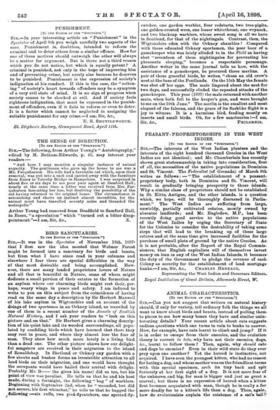BIRD SANCTUARIES.
TO THE EDITOR OF THE " SPECTLTOB."11
SIR,—It was in the Spectator of November 13th, 1897' that I first saw the idea mooted that Wolmer Forest might be formed into a sanctuary for birds and beasts, but from what I have since read in your columns and elsewhere I fear there are special difficulties in the way of that most desirable end being accomplished. How- ever, there are many landed proprietors lovers of Nature and all that is beautiful in Nature, some of whom might dedicate a small portion of their estates to the formation of an asylum where our charming birds might rest their, per- haps, weary wings in peace and safety. I am induced to write to you on this subject from the coincidence of having read on the same day a description by Sir Herbert Maxwell of his lake asylum in Wigtonshire and an account of the doings of two sportsmen in an Orkney island, as recorded by one of them in a recent number of the Annals of Scottish Natural History, and I ask your readers to " look on this picture and on that." Sir Herbert gives a charming descrip- tion of his quiet lake and its wooded surroundings, all popu- lated by confiding birds which have learned that there they may rest in peace, and where they almost lose the fear of man. They show how much more lovely is a living bird than a dead one. The other picture shows how our delight- ful songsters are received in their migration to the island of Ronaldshay. In Shetland or Orkney any garden with a few shrubs and bushes forms an irresistible attraction to all land birds on their migration, and one would have thought the occupants would have hailed their arrival with delight. Probably Mr. B— (he gives his name) did so too, but his point of view was peculiar. He tells us that he and his host made, during a fortnight, the following " bag " of warblers. Beginning with September 2nd, when he " wounded, but did not secure, his first whinchat," be tells us that he bagged the fallowing :—sia ruffs, two pied-flycatchers, one spotted-fly-
catcher, one garden warbler, four redstarts, two tree-pipits,. one golden-crested wren, one lesser whitethroat, one wryneck, and two blackcap warblers, whose sweet song is all we have in Scotland, for that of the nightingale. Contrast, then, the Wigtonshire eden with the Orkney shambles ! Compared with these educated Orkney sportsmen, the poor boor of a. gamekeeper who was lately alluded to in the Field as having shot " seventeen of them nightingales for preventing his pheasants sleeping," becomes a respectable personage. Another writer in the same journal tells us how, with the assistance of a gamekeeper, he procured three merlins. A pair of these graceful birds, he writes, "chose an old crow's nest at the base of the Pentlands. On the 15th May the female was shot off her eggs. The male lingered about the nest for two days, and successfully eluded the repeated attacks of the gamekeeper. This year (1897) the male returned with another mate, when both fell to the keeper's gun, and were brought to me on the 10th June." The merlin is the smallest and most elegant of the falcons, and the grace of its flashlike flight is a joy to witness. It is a harmless bird, feeding mostly on insects and small birds. Oh, for a few sanctuaries !—I am,.


































 Previous page
Previous page